#the way this show begs for textual analysis is PERFECT
Text
the clever way they set up izzy the unreliable narrator is just… such good writing
i started making a complete list of “things other people agree izzy is good at” and “things only izzy says he’s good at” for brain distractions and on that first list is swordfighting
the second list is …everything else, i truly do find this little fucker so fun on a narrative level. he’s the textbook unreliable narrator: literally everything he says ends up directly contradicted by the people in question or the action, but he swaggers around yelling his version of events loudest! (and weirdest, lmfao.)
and honestly on a deeper level it makes us as an audience look at how we process things people tell us vs things people show us, and how those are often very much at odds.
the writing on this show is ridiculously good, you know?
#jackie’s hilarious “jesus christ this idiot” face is so amazing sidenote#everything about jackie is peak entertainment#also seriously i love how they set this up#its so easy to just listen to izzy and fill in the blanks he tells us to fill in#he’s a loud confident white guy! we love to associate all those traits with logic and truth and power and natural skill#and then you have fang and ivan and ed and jackie like “yeah nah it’s uh. look we all just sort of accept he lives in his own narrative”#ofmd spoilers#the way this show begs for textual analysis is PERFECT#(well confident in these matters l o l @ his general mental health and self concept)#izzy hands go to fucking therapy in s2 challenge#but also pls stay suspended in amber in this weird little state you are in#it pleases me#i want to poke at your various components and ask them: why?#why’d you do it like that why’s it so weird why is con why is anything???#like. seriously. he is a feast for my weird id and my think-y brain thoughts#A FEAST TRULY A SONUVABITCH A WONDER AN IDIOT A FUCKIN …SCRUFFY LITTLE NIGHTMARE I LOVE GI#…him no i will not retype that insane sentence fuck that i do what i want#anyway he is. so dumb. so fun. so sad. so terrible???#a true pickle jar denizen if i ever saw one#ATE. HIS. TOE. LOVED. IT. P. CAME. THE. END.#my ofmd meta
364 notes
·
View notes
Text
Re-liveblog: eps. 22-23
[ep 22]
Ooh, Meng Yao as a spy makes more sense. I was thinking about Qing or Ning and wondering since when either of them counted as Xichen’s “old friend”.
I, of course, immediately accepted he was a spy, even before he was textually declared as such and only just appeared as WRH’s right-hand man. It wasn’t until very recently that my eyes were opened to the fact he did lure the army into a trap, a trap that he personally designed, and the battle was only won thanks to WWX and his secret weapon, which MY couldn’t have predicted, in the show at least. So what was his plan? Was it different in the book? Why would he put LXC in harm’s way, when MY|JGY defined their entire relationship by the avoidance of that?
We’ll only see this in the flashback, but I find it very curious that he let NMJ see his true face and live. And in this episode, we see reaction shots of MY being concerned when NMJ is losing the fight -- and since nobody is looking at him, this reaction must be genuine. Which implies that he is not committed to the Wen cause, and is keeping in mind the consequences of their defeat. It would have been a very bad look for him if the allies won and discovered NMJ recently died in his custody. Too bad MY miscalculated how important the lives of those random Nie cultivators would be to NMJ. If only Meng Yao did anything but kill them, I suspect the course of his relationship with NMJ would run very different.
(It’s also funny that the battle plan includes Missiles That Make People Explode... That are used on a couple of redshirts and not, say, on anyone crucial to the allied war effort, and are never mentioned again. And then WWX stands around for about 10 more minutes before deciding to do something. The direction of this scene is... not the best.)
[ep 23]
It’s painful to watch the fear and reverence Meng Yao still holds for his father figure. The flinching, the hiding, the immediate supplication – when was the last time he felt safe and respected, before the bullying with the Nie and having to watch and even partake in atrocities with the Wen? I hope he can finally have some good things in his life now.
First of all, it’s very funny in retrospect to see myself constantly refer to NMJ as MY’s father figure. Well, it’s not my fault that I wasn’t shown the full scene where MY seductively strokes NMJ’s saber until much later! (Although to be completely fair, considering what JGY eventually did to his father, and what else he did in the tv show knowingly as opposed to accidentally in the novel, maybe these interpretations aren’t as incompatible.)
The interesting thing here is that I, once again, completely bought what MY was selling to NMJ with considerably less success... So my interpretation of this scene was completely off-base -- but on another level, I still agree with my initial assessment.
I pitied MY when I thought the immediate overperformance of submission was his natural unfiltered reaction. Now I find it notable that this is the behavior he intentionally chooses -- both as the default survival mechanism over the course of his life, and in this specific scene. And in this scene, this behavior is targeted at and fine-tuned for LXC -- but not NMJ.
The very first thing MY learned about LXC is his protective instinct over him. The best manipulation is not a lie but the truth with certain omissions; he is afraid for his life when a strong angry man he just wronged is brandishing a giant blade at him -- isn’t it nice to have another strong man whose protection you can guarantee by jumping behind his back and grasping at his clothes helplessly? I mean, it’s not much else he can do in this situation, and when I was watching for the first time, I of course didn’t know he had actually killed people in cold blood a few minutes ago, so in this context his apologetic attitude makes more sense, he should be acting like that. But LXC doesn’t know either, just like a first-time viewer! When MY triggers LXC’s protective instinct by crying for his help personally, presenting it as “us against them” (them as NMJ, in this case), LXC doesn’t see the manipulation. When MY shifts the blame on NMJ -- “It's as you can see. In the situation a moment ago, even if I explained, Clan Leader Nie wouldn’t believe me” -- NMJ sees through the bullshit and even laughs at it, but the spectacle isn’t for him, it's for LXC. And NMJ can see it -- he watches MY the damsel in distress tenderly touch the arm of his valiant defender, watches the tidy, polite, performative way MY kneels to apologize, and sighs -- he knows MY has won this round. At least over LXC.
But in addition to what NMJ already knows and what MY has not repaired, MY makes another important mistake. This part of the scene will only be shown in the ep. 41 flashback, but MY still doesn’t understand NMJ’s worldview and apologizes only for insulting him personally. He not only fails to apologize for taking innocent lives, but tries to defend his decision.
Does MY still care for NMJ? From his concern in the previous episode, it does seem so. Does MY still hope to regain NMJ’s favor? Maybe, but due to a combination of not understanding and not prioritizing NMJ, this is instead the scene where MY loses that favor forever.
The above only applies to The Untamed. In the book (chapter 49) the dynamic is very different. When NMJ awakes, MY is carrying him and Baxia to safety alone. In the show, LXC is present from the beginning of the scene, and MY feels safe enough to play them against each other. In the book, he has no means to protect himself and is absolutely terrified. A very interesting paragraph:
He suddenly shouted, “ChiFeng-Zun!!! Don’t you understand that if I didn’t kill them, you’d be the one who died then?!!”
This was actually the same as saying, ‘I’m the one who saved your life so you can’t kill me or else it’d be immoral.’ However, Jin GuangYao was indeed worthy of his reputation. The same meaning but a different wording, and he was able to create a contained sense of frustration and a reserved sense of sorrow. As he had expected, Nie MingJue’s movement halted. Veins stood out under his forehead.
Having paused for a while, he clenched the hilt of his saber and shouted, “Very well! I’ll kill myself after I kill you!”
In the show, NMJ is already selfless and offended only on behalf of his murdered subordinates -- but the book takes it further, and he’s ready to sacrifice his own life if it means avenging them. Then the entire next paragraph is an almost comical chase where “one striked with madness and the other fled with madness”. When LXC finally showed up, “Meng Yao looked as if he had just seen a god from Heaven. He quickly scrambled over and hid behind the person’s back”.
In other words, the full scene in the book reads almost exactly as the incomplete version of it in episode 23 looked to me on the first viewing. There’s no layer of manipulation -- Meng Yao simply is terrified of one man and seeks protection from another. And most of the dialogue is the same -- but just via the staging and acting choices, the scene gains a second, darker meaning. Which fits with the show’s tendency to villify Jin Guangyao. He can’t even beg for his life without it being a manipulation! What in the book was a wholly sympathetic moment of desperation for him, in the show is made calculated and two-faced.
Back to The Untamed!
LOVE how Xichen immediately calls him “A-Yao” while standing right between his shitty fathers
Lol, this was truly a moment for the ages! Too bad we only saw NMJ’s reaction (because he was in the frame with LXC) -- I really want a reaction shot from JGS to this!
The following private conversation between JGY and LXC caused me almost physical pain on rewatch... A note from this (third, I think?) viewing: the line “I’ve followed Clan Leader Nie for so long. I know his intentions. I have also never taken it to heart before” which is a perfect continuation of the previous scene: JGY paints NMJ as unreasonable, and himself as selfless and accommodating. Oh, and of course makes LXC say “No-no of course I didn’t mean you were evil!!” I also continue to feel like I’m the one stabbed in the heart by their sad smiles, when they both know something is ending but can’t or won’t talk about it -- but I’m preaching to the choir here.
What I do want to comment on is another thing missing from the written liveblog -- on my first viewing I apparently misunderstood the conclusion of the scene.
What I thought was happening: JGY did proceed to enact the plan he described; the “old, weak, women, and children” he offers to send to Qiongqi Path were sent there, and were the same group of people later rescued by WWX and led to Burial Mounds; the small group of people JGY had with him under arrest are “those who really had a hand in the bloodshed” whom he openly proposes to execute, to which LXC agrees; and the twist at the end is that he relished in overseeing or even performing the execution himself, seemingly in a very brutal way.
But according to this analysis, which I trust, JGY immediately broke his word and executed the innocent prisoners that he promised to only imprison. This would definitely make more sense for the drama of the scene and the meaningful look JGS gives him... But there were only few people under arrest in this scene, and none seemed too old or too young, and where in this case did the Wen remnants of the Qiongqi Path who latter committed the Burial Mounds exodus come from?
[Episodes 4&10]
#the untamed#jin guangyao#nie mingjue#lan xichen#jgyreliveblog#this has been sitting in my drafts for like a month for no real reason#so some of these points may have been addressed by things i've written or reblogged since then#i had to take out the external link to the mdzs chapter so that the post could show up in the tag#sorry about that
10 notes
·
View notes
Text
Burn This 7/14: Final Show Recap
Burn This is over and I’m a mess of feels. This play has gifted me with four solid months of incredible performances, late NYC nights with friends both new and old I will treasure forever, and short but beautiful moments of dreams coming true at stage door. The final performance was overwhelming, hysterical, and oh so bittersweet.

First – A conclusive update about the letter book! After Adam didn’t come out to stage door on Friday or Saturday (understandable tbh because both nights had giant, rowdy crowds), the crowd was absolutely MASSIVE on Sunday after the last matinee. People were pushing, crowding, yelling Adam’s name and it was absolute madness. When Adam got down to me, the crowd was literally pushing in from every angle and there were about ten people reaching their Playbills out to him around my head, but I just started talking. Given the manic atmosphere I only had time to get out something like: “I’ve seen the show several times and had incredible dialogues about it. This is a collection of messages from people about what the show meant to them.” Adam literally could not stop moving or else the crowd would have caged him in, but he looked back at me, still listening, and when one of the security guys took the book Adam looked straight at me to acknowledge and thank me! Both he and the security guard assured me it would get to him. I didn’t get to explain it fully but I think he understood what it was and the book will speak for itself!
This is the cover I made for the collection:
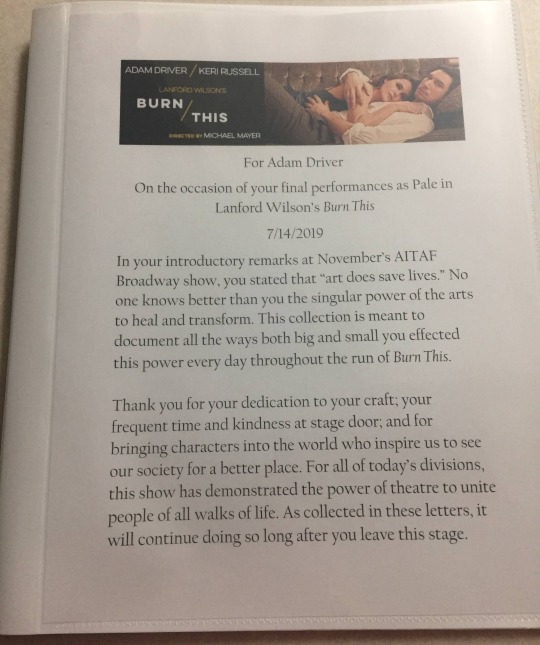
You can see me hand over the white laminated book right at the beginning of this video, and Adam look back to say thank you.
My friend next to me also took this video where he looks back at me for half a second :’D And gives a tiny smile! (in the middle of that pandemonium, poor bb)
vimeo
Let me quickly say a big THANK YOU to everyone who contributed. <3 After that insane crowd at stage door, those wholesome, thoughtful messages about his work in this play would be the perfect remedy. Thank you so much to all of you for taking the time to write out appreciation for everything he gives us. :’)
NOW, the show!
Okay so firstly, the downside: I was NOT impressed by the audience. A lot of people seemed to have seen the show before (not that I’m judging, clearly) but were laughing CONSTANTLY at everything Adam did. To the point where you couldn’t even hear his lines half the time, and the audience failed to grow appropriately somber in the moments when he falls apart. Not a very courteous audience at all.
But the cast!!!! There were some poignant moments when it really seemed to be their real emotions coming through, bleeding into the way they played certain scenes. During the infamous, always-entertaining exchange in Act 2 while Adam’s sitting on the couch in the robe asking “Who’s the apple and who’s the orange? You never had an apple tart glazed with orange marmalade?” I SWEAR there was a second where that grin was all him, having an absolute ball of a time. When he said “who’s the orange?” he literally kicked his feet up like an overexcited little kid and it was THE. PUREST.
Okay so in the interest of remembering as much as I can, I’ll go in order from the beginning!
First, a bit of textual analysis. Every time I see the play, I’m struck by how incongruous the first twenty minutes seem in comparison to the rest. I know that’s on purpose, because Pale’s entrance is very much supposed to shake up and tear into Anna’s world with pure chaos – turning everything on its head. But knowing everything that’s going to come after, all the lofty discussion in that first scene about myths and epic love tropes all seems terribly self-aware. It’s more than foreshadowing. It literally seems to be a self-narrating framing device for everything that’s about to follow after:
“The wives of the sailors out at sea. The women waiting for years and the men never coming back. What sustains them through loss? Through pain? I think they felt things in a more profound way.”
Robbie is never coming back, and Anna is searching for something inside herself – some feeling – in order to push through this mess of grief and frustration that she can’t make sense of even to herself. She has a shell around herself at the beginning, and nothing to break through it or guide her way; no direction.
“The Flying Dutchman – Senta throwing herself into the sea to save the Dutchman from perdition.”
(I mean come on – In this story Senta literally “has this boyfriend hanging around” getting in the way of the epic love and this couldn’t be more meta if it tried.)
Knowing what’s to come, it’s striking that Anna doesn’t seem to realize she is the real subject of conversation here, not Burton’s lofty novel ideas. Even a mere ten minutes after she recounted the funeral where she swore she was expected to “throw herself over the casket” – she doesn’t seem to relate herself to the story about Senta hurling herself into a watery grave because of the love and loss of a man.
In some performances, I think Anna is closed off because she’s purposely trying to avoid such a fate for herself. After losing Robbie, she doesn’t want to “sacrifice herself” through deep connection to another person ever again – Not even to Robbie’s memory as she refuses to give in and confront her grief. And hence her resistance to starting a real relationship with Pale. In other performances, it seems that she’s genuinely blind to the walls she has put up around both herself and her own emotions. You can see the walls in her physical body language – How she always seems to be sitting in defensive, closed-off positions when Burton tries to get near her. (Contrast that with how she literally wraps herself around Pale while he’s crying on that same couch later.)
Anyway, I just find it incredibly cool that what at first seems to be snobby, “arty” (to take Pale’s word) aimless talk at the beginning is actually all the characters indirectly reflecting on everything that’s about to happen to them – to Anna, particularly. This same exact self-examination resumes in the first lines of Act 2, when Anna finishes reading Burton’s draft script.
“It’s so sad.”
“I thought they were having fun.”
“But beneath it all, they’re so lonely.”
There it is – The deceptively simple three lines that sum up the entire play and spell out the tragic beauty of Pale and Anna’s relationship.
OKAY I’ll stop with the analysis now. On to the details everyone cares about!
So when Adam charged out, holy shit his voice sounded SHOT. It took a good few minutes for his yelling to warm up enough for his voice to stop sounding completely hoarse. It clearly cracked a few times and I just wanted to brew him some tea. (A pot, of course, because a cup wouldn’t even be economical…)
But by around the time he got to my favorite, side-splitting monologue about imagining you’re a tree and you get made into toilet paper or money to get passed around or parchment for a restaurant or music paper for the Boss to write on… but either way you end up drifting down to get stuck in some Saudi Arabian oil tank propellers. (Bending down and spinning his arms like propellers and cue me absolutely falling apart each and every time.)
…. His voice finally sounded fine by then! :D
I’ve forgotten to write this in previous posts, but in plays I always LOVE moments when the actors come right to the front of the stage and just stand there for a long moment, wordless and motionless, just staring out into the theatre without really seeing anything, lost in the gravity of their own emotion. Keri has a moment like this before Pale’s entrance (I think when she says, “I thought everything important to the future of dance was going to happen in this room.”) Adam has his moment while Anna is talking about Robbie’s dancing, how good he was and how Pale would have liked it. Adam just stares out into infinity for a long moment, while it demands physical effort from him in order to take in what Anna’s saying. He doesn’t smile while he says, “You saw him and say he was good. I never saw him and I know he was shit.” His long moment of stillness here – finally facing the audience in close proximity and unnerving silence (a striking moment after he spent the last fifteen minutes raging around the stage and often having his back to the audience) is when you can see the very beginning of him unraveling. This is when he starts to plateau – tumbling from his coked-up high into a dark, helpless pit that cleaves him clean through.
After bitching about his pants getting ruined and putting his leg up on the sofa to show Anna, he did the most RIDICULOUS twirl this time! After slowly lifting his leg over the table, never breaking eye contact with her once, he then did this slow, melodramatic twirl - complete with extended ballet fingers and everything. It was nothing short of glorious.
After he kneeled down and screamed, he rose completely shattered. I don’t think I’ve ever heard his voice so devastated with sobs and tears – to the point where you could barely understand him. “No, I don’t do this. This ain’t me” sounded like he was begging desperately, but had no idea what for. There are a lot of stunning things Adam does in this play, but rising and sinking and rising again through these completely polar opposite, all-consuming emotional states within the span of twenty minutes has to be the most incredible. He truly embodies the transformations with his entire body – The way he paces around aggressively then helplessly, the way he spends long, silent minutes simply rubbing at the same place on his chest in pain, the way he doubles over as the brunt of his grief settles upon him like a crushing physical weight. The way he channels his very physicality to embody menacing one moment, then vulnerable and helpless the next. It’s just nothing short of breathtaking and awe-inspiring.
Okay okay, after he drops the hilarious bomb out of nowhere: “You know you got no tits at all.” And when the exchange ends with “It makes a man want to look, see how much there is” – Afterwards he just looks over at her with this hilarious, seedy smirk that was GOLD. Almost like “so is this hapless seduction working????”
Watching the couch kissing scene was, again, like being seduced yourself. He just stares at her for such a long moment before finally leaning in for it. She knows what he’s thinking – she knows what he’s going to do, and she’s completely mesmerized by the intensity of his single-minded focus; even as his hand reaches out for that gentle, tentative brush along her hair. Making sure she really wants this before he slides into it.
And then…. God, the way he delivered the lines that are some of my favorites: “Let’s start the engines real slow here. Go halfway to the city, stop for something to eat. You’ll find there’s times I’m a real good listener.”
jsdfjadlj his voice is so soft and deep, while he’s looking at her so intently, almost communicating the words with his gaze alone. He speaks so slowly and purposefully. The words themselves might be flippant in the double entendre, but there’s a sincerity behind them that wraps itself around your heart completely. You can see it wrap itself around Anna, as she falls into him completely. Every single person in the audience would probably do the exact same.
When he leaves the next morning, it never fails to make the audience crack up how he just waltzes out the door with no great to-do as he calls “Alright people, I’m outta here!”
CLASSIC.
Act 2:
After Burton flips him onto the floor and keeps yelling at him, the way Pale just rolls away onto his side and goes “Good night” all mischievous and cutesy asldfjsadlkfj. And then “Good night, Bruce!” after Burton finally leaves.
Other honorable mentions from this scene:
Pale, from offstage: What the fuck do you know?!
Larry: Hmm… what do I know? That’s one of those questions you don’t know whether to answer with hubris or humility.
“Who’s Bruce Lee?!”
After Anna and Larry left the room, Pale’s fighting with his coat was extra aggressive this time. He was basically windmilling his arms as he repeatedly yanked at the back of the jacket until finally flipping it up and off and over his head.
Okay okay so I know I already talked at the beginning about the robe scene but I swear this one was EXTRA delightful. He was just grinning and cheesing all over the place at his own cleverness with the “hat trick” joke. Looking SO pleased with himself and just infuriatingly adorable for a giant brickhouse of a man in a stupid purple kimono I mean wtf!!!!
Oh and right before that! When he brought Anna the cup of tea after sabotaging her phone call with Burton and then hiding his face behind the robe sleeve all coyly, he was extra sweet about it this time :3 After handing her the mug he kissed her twice on the forehead, then just stared for a second at her grumpy face before kissing her on the nose too. (!) Then he proceeds to do the cute thing where he tucks her hair behind her ear while asking, “You want some eggs?”
Even when Anna shuts him down, the way he went over to sit on the couch, picked up his tea, then gave these awkward looks to both Anna and Larry like “welp, guess we’re all sitting together now” was sO funny. How the man can deliver such comedic effect without saying a word is beyond me.
Then, Anna starts to blow up at him. When she delivers the final, most devastating blows of “I have nothing for you. I don’t like you, and I’m frightened of you” – I’ve taken to watching Adam as the blows land. He stands there completely still and his face barely moves, and yet there’s this unmistakable, silent devastation about him. The man’s been called the “King of micro expressions” for a damn good reason. This time, after several long moments of tense, pregnant silence – He just did this minute shake of his head as he looked right at Anna. Even for all her anger, he still doesn’t really believe that she means what she’s saying. But that tiny shake of his head spoke volumes. It was almost disapproving, almost pitying, maybe a touch frustrated. While in previous performances he often seemed to be completely crushed – all spark drained from him; There was this bare, subtle moment of disbelief and lingering defiance. Disbelief that Anna was really deluding herself so thoroughly. He is so sure in this scene – while he’s telling her she’s not really afraid of him, she’s only afraid of caring and feeling something – that she feels the exact same way he does. He’s sure their connection is on equal terms; just like he’s sure it’s the only honest, true thing in either of their lives. And in this performance, rather than being crushed by Anna denying it all, he seemed more upset on her account – That she wasn’t letting her walls down to let the truth in, as he already has.
That^ is Adam Driver’s talent, ladies and gentleman. I literally just wrote a whole paragraph about one barely-perceptible nod. Damn. Okay. Give me a second here to pick up the pieces of my feels.
Okay, so I have detail-level and meta-level thoughts on the final scene from yesterday. Detail-level first: Last night was the only time I’ve ever heard Adam deliver the “That was me and you up there” line softly and earnestly, rather than pitching it into a teasing joke with “me and youuuuu up there.” Instead, he kept the tone of the scene gentle and almost timid. I adore in this scene the way he asks her about her dance piece. How at first, he’s not there for himself or even for the idea of them together. He tells her how much he enjoyed the piece, and when he says that he knew it was Robbie – that he could see Robbie in it – there is no greater or more moving praise Anna could receive. Nothing could mean more to her in this moment.
This scene is so quietly gorgeous, and it was simply spellbinding yesterday in how the tone remained so tender all the way through. Throughout the entire scene, the two of them mirrored each other with absolute perfection. A large part of that is because you can tell these are two actors who’ve been playing off each other for months and developed such keen awareness of each other’s physicality and tiniest displays of body language. Even in the way they stand at opposite sides of the stage at first – It’s like they’re tied together by invisible threads. They face each other directly – neither turned away or trying to hide – and when one moves, the other seems to respond exactly the same way. It continues once they sit down together to burn the note. From the way they sit beside each other to watch it burn, to the way they slowly turn towards each other and draw together, they move in perfect harmony and symmetry. They are tuned into each other simply effortlessly and it’s so satisfying and beautiful to watch.
At a higher scene level: It’s so lovely how different this scene feels in comparison to their explosive earlier scenes. (One with sexual energy and another with an angry fight.) There’s this feeling of undeniable rightness and ahhfinallyrelief when they’re back together for this final scene. And as they talk about Robbie through Anna’s dance piece, everything feels different. It feels peaceful for the first time, even a touch reverent as they speak with a shared understanding of each other’s loss that no one else in the whole world could take part in. While earlier in the play, discussion of their shared feelings of loss led to negative acts of self-destruction, aggressive frustration, or self-denial; this time there is finally the feeling that these two can come together and create something positive out of the loss they’ve shared. Thanks to what Pale unlocked in her, Anna’s feelings of loss that were once so unbearable she could not even face the honest thought of it, now became the fuel for an act of creation she’s been striving for her whole life. And the fact that Pale made time to come see it; the fact that he appears in her apartment and can voice so precisely her same sentiments that went into the piece – It means they’ve finally reached a place together where their connection becomes a source of creation and positive beginnings.
Adam does such beautiful acting in this scene. “I don’t know what to do with myself here. I’m 36. I’ve got a wife, two kids…” He paused here, and when he spoke again his voice quavered with feeling that simply overflowed, “I ain’t never felt anything like this.”
One of my favorite images from the whole play is when they both silently sit together on the couch, watching the note burn away in the ashtray together.
(For the first time, I thought back to Act 1 when Pale cryptically answers Anna’s question about what he does with “I’m a roving fireman. I put out fires. Sometimes… just let it burn.” In this case, perhaps this fiery thing between them would be safer if it were put out. But they watch the flames dance and dwindle together, and the warmth and light slowly growing between them is something neither of them have the will to put out.)
And then, that touching, movingly desperate final moment. After “I don’t want this” / “I don’t want it too” – when Anna sinks into his arms and he hurriedly gathers every bit of her in his lap and in his arms that he can fit. He clutches her like she’s part of his very being, rocks her, and reaches up to smooth her hair back so he can kiss her head. His voice breaks again when he confesses, “I didn’t expect nothing like this.” Another moment of desperately holding each other, until Pale half-sobs in helpless apology, “I’m gonna cry all over your hair.”
Every single time, the way Adam says it delivers a swift, sweet blow straight through the heart. Honestly, I would do anything to relive that wrenching heartache again. <33
It’s been an incredible run. I miss the show already, but I couldn’t be happier with the moving, magnificent nights I spent in the Hudson Theatre. Thank you to Adam and the whole cast for touching so many of us every night with this beautiful play. :’’) It has been such a thrilling, joyful ride!






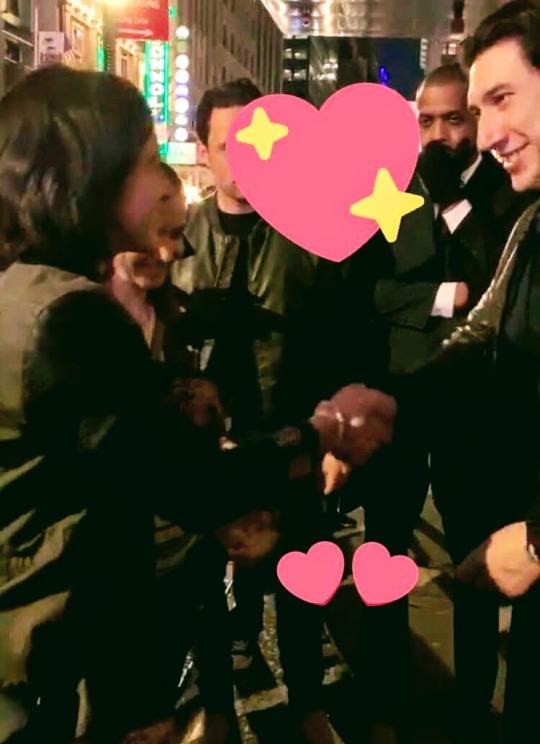
-Until Adam’s next play!!! :)
126 notes
·
View notes
Text
Cooking with Fannibals: Paratext, Textual Poaching and Hannibal fandom
In the current television environment, the perception of television contents for fans is not confined to the specific scene of the show. Owing to varieties of activities, it gradually reshaped and formed into a virtual community where fans could express their ideas, communicate with different members and even make contributions to. Sandvoss (2005) notes that ‘the study of fans and fandoms has formed one of the most proliferating areas of media and cultural studies in recent decades’. Due to the remarkably growing of fandom, fans participate with TV producers and showrunners more and more often by utilizing social media as platforms. They tend to be more creative and active by writing fan-fictions, producing parody, fan-act and creating memes, gifs. According to a report by Macklem (2013), it points out that two thirds of producers will take fan’s ideas into consideration, but only 9% have taken these suggestions into the show. On the other hand, Jenkins (1992) also states ‘fans lack direct access to the means of commercial cultural production and have only the most limited resources with which to influence the entertainment industry’s decisions.’ It is true to a certain extent that creators of show have aware of the importance of interacting with their fans. While others consider producers are still dominant to the show and decide where the show’s major direction is head to. Hence, this essay focuses on whether fandom has the power to influence the show. If so, to that extent? Firstly, a case study from NBC’s Hannibal will be described. Subsequently, two concepts named paratext and textual poaching which relate to the case study will be discussed. Moreover, a critical analysis of the case study will be given by applying the two core concepts as tools. To conclude, since the conflict between fans and producers is almost in every media fandom, reflection around whether it can find a balance between these two will be considered.
Pearson (2010) suggested that “the digital revolution has had a profound impact upon fandom, particularly as it blurs the lines between producers and consumers, creates relationships between powerful corporations and individual fans”. It could be considered that the 2013 TV show Hannibal is a perfect example to present the relationship between producers and fandom. The story of Hannibal Lecter was introduced in 1981 thriller novel Red Dragon by Thomas Harris, and developed in the following 3 books Silence of the Lamb (1988), Hannibal (1999) and Hannibal Rising (2006). This series of suspense novels attracted movie maker’s attention then turned into 5 movies which are Manhunter (1986), Silence of the Lambs (1991), Hannibal (2001), Red Dragon(2002) and Hannibal Rising (2007). It is generally recognized that the movie silence of the lamb has culturally, historically and aesthetically significance and won Academy Awards in Best Picture, Best Actor, Best Actress, Best Director, and Adapted Screenplay. While after a long period of time there was no adaptations of the Hannibal Lecter franchise due to the critics about the subsequent movies until in 2013 the American broadcast network NBC considered to ask Bryan Fuller to make a television series in order to reinterpret the Hannibal universe. The show tells a story about a FBI special agent Will Graham and a forensic psychiatrist Hannibal Lecter which set up before the Red Dragon events, took on new, unexplored adventures and referring to the original books at the same time (Andersen, 2016). The show has gain huge popularity among internet fandoms within two months and seems to reach the same enthusiasm which reserved for three current TV shows Supernatural, Doctor Who and Sherlock. It is evident that the success of the show not only rely on the elaborate production by the staff of the show, but also the way that creators interact with fans proactively. Therefore, paratext and textual poaching are two aspects to look into the relationship between producers and fans.

Paratext has been examined since 20th century and now is widespread in media industry. There are many different definitions of paratext, for example, Genette (2001) suggests an explanation for Paratext that it is materials such as author’s name, preface, the title, introduction, illustrations or even audience which accompany the text in a published work. It also indicates that it is “more than a boundary or a sealed border, the paratext is, rather, a threshold." It is reasonable believed that paratext could not stand on its own, but became a significant element in a triangular relationship between Text, Audience and Industry. In addition, Gray (2010) mentions that the theory of ‘The Big Three of media practice’ and as well points out that “Industry and audiences create vast amounts of paratexts. Audience also consume vast amounts of paratexts.” Next, during the history of participatory culture, it is interesting to see that the producers and fans were in a state of conflict. Backing to the 18th century, media sees “readers” as passive consumers who need to be informed by the “producers” of knowledge and communications media. De Certeau (1984) comments that “this legend is necessary for the system that distinguishes and privileges ‘producers’, in contrast with those who do not produce.” In addition, Jenkins (1992) further asserts that “fans must beg with the networks to keep their favorite shows on the air, must lobby producers to provide desired plot developments or protect the integrity of favourite characters. Within the cultural economy, fans are peasants, not proprietors”. For example, under the public pressure, Arthur Conan Doyle was forced to write The Adventure of the Empty House in order to bring Sherlock Holmes back to life. It is generally agreed that the fans were too obsessed to this character to let the character go, then strongly requested the author to continue his writing about this genius detective. When the digital age comes, due to the rapid development of internet, fans seem to be more interactive with shows than in the past and even negotiated with showrunners. Fans are capable of reinventing media text by making fan films, parody, memes, gifs, writing fan fictions on tumblr and tweets as characters. Nevertheless, several initial studies seemed to against this concept. Recently, fans request more and more often and seems to take control of where the direction of the show is about to go, therefore, TV Writers and showrunners increasingly ‘mute’ the fans. For instance, House of Cards issues an entire season all at once, when the first episode out in the air the last is finished in advance. The showrunner Beau Willimon says despite the fact that he engages with fans online frequently, he hardly reads the increasingly ubiquitous recaps or articles on social media, he wishes it is a process of exploration (Grant, 2014). In this situation, a new approach of delivering story has emerged and gradually take power back to producers’ hands. Furthermore, although the show has successfully renewed for three seasons, NBC confirmed that it will no longer pick up fourth season of the series based on the Thomas Harris novels. As a result, fans were not satisfied about the decision, they ‘slam over’ the network but it seems that the ending is destined. Hence, where does the power lie, audience or producer?
Besides, there are several cases that producers and fans achieved a balance or even cooperated each other and receive mutual benefit. The controversy TV series which present how producers deal with the relationship between showrunners and fandom is NBC’s Hannibal. Differ from other shows, staff of Hannibal including producers and actors all have created strong connections with fandom. Bryan Fuller, as the creator of the show, has a personal Twitter account where he tweets and retweets all things relevant to Hannibal. For example, he often posts behind the scenes photos, sketches or concept design from the set.


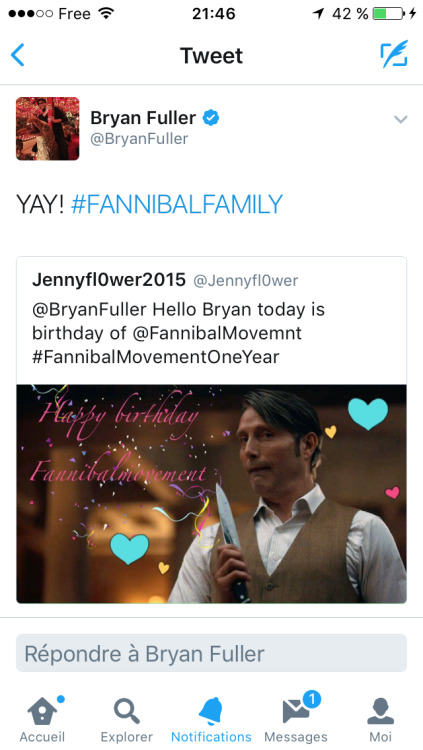
Furthermore, Bryan often retweets fans about their fan-art, text and photo. From the perspective of paratext, it is actually a significant way to show their fans that producers are paying attention to fan’s works and contributions to the show. On the other hand, it is also an encouragement to the fans that the showrunners approved and appreciated the participation of the fandom. What is more, Bryan responds to almost every fan tweets regardless of whether the question is important, entertaining or not. As a matter of fact, by the participation and presence of Bryan on twitter. It seems that he creates a proximity to the fandom, in other words bond to his fans personally.
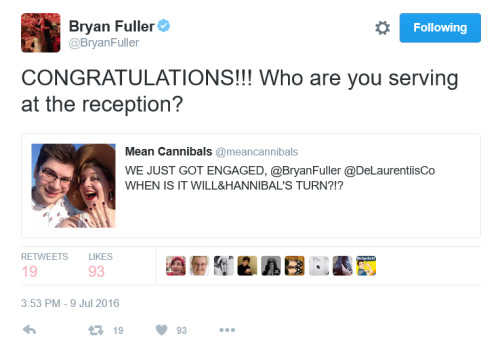
Also, it could advertise the show due to the fact that his actively participation with fandom potentially motivate fans themselves to be more engaged with the show. Then, social media could help to bring up the popularity and raise the curiosity of people who haven’t seen it. Apart from twitter, Hannibal is quite stand out from other fandoms, which it has an official Tumblr site to present the show in a different way. It allows fans to create longer texts including quotes from the show, GIF sets and behind scene photos. Although, it may seem lack of direct contact between producers and fans, “the heavy reblogging of fan-produced content creates a back-and-forth sharing of information” (Segal, 2014).
In fact, this show has a special symbol—flower crown. It first appears on the characters on the show that Photoshops by fans. It seems quite irony due to the fact that the tone of the show is dark and serious. And the Hannibal fandom took it a bit further, it can be seen that the fans, even the producers were wearing the flower crown which made by fans themselves on the comic con as well as on panels. Answering an audience Q-A while putting on a flower may appear incomprehensible to most of people, but it also symbolic of how well the Hannibal producers are treating their fandom and value their input(Baker-Whitelaw,2013).
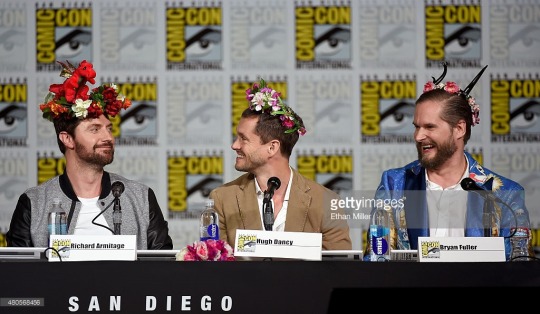
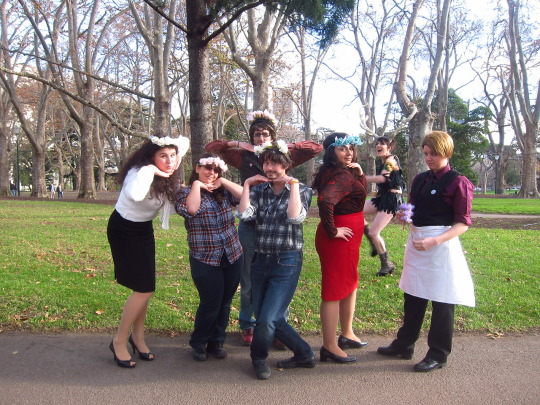
Secondly, shipping is an important element within a fandom. Fans often tweets, making fan art and video about the ship “Hannigram” (Hannibal Lecter/ Will Graham). Fuller, as an openly gay man, didn’t try to deny the implies of the ‘ship’ but to face it and respond to fans. Even more impressively, Fuller and one of the main actors Hugh Dancy fielded the question about ‘slash fan fiction’ with much more understanding than many showrunners who have been attending Comic Cons for a long time. When one of the fans asked about the meaning of the relationship of ‘Hannigram’ pairing, Fuller comments “it brings up an interesting question about ‘what is love’. And love between two characters doesn’t necessarily have to be sexual to still be love. It can still be valid; it can still be powerful” (Segal,2014). Unlike Sherlock, one of the popular shows which taken over the internet, the creator Steven Moffat seems often spoke of his antipathy towards the pairing of ‘Johnlock’ (Sherlock Holmes/ John Watson). The writer seems to have resented the fan’s contribution, and even spent the first episode of forth season that pictured an image of a group of obsessed followers, such as nerd and overweighed woman sit around and investigate how Sherlock managed to survive in the end of season two in order to mocking online shipping phenomenon. However, the executive producer of Fox’s Sleepy Hollow, Mark Goffman seems to struggle with whether he should cater to fans and give them some Easter eggs for them to talk about or just keep the show progress rather than ‘bring one of the character back to life’ just because fans like the character(Segal,2014).
Lastly, it is known that food is the essential part of the show. Therefore, a most unique and surprising production Feeding Hannibal: A Connoisseur’s Cookbookhas made by Janice Poon, the cook of the show itself. It is a collection of easy-to follow recipes inspired by the show and created by its food stylist. It not only has recipes but also the origin illustrations of the food, behind the scene photos of stars and crew on the set of Hannibal. It could be observed that paratext from industry and audience offers a physical connection to the show. As a result, it seems not very surprising that the fans were respond positively and post pictures or tweet about it. On the amazon site, there is 94% of reviews have 5 stars, customers comment the book “a must own for fans of the show and people who like cooking something a bit unique and stylish” (Borders, 2016).

Then, textual poaching is another approach that fans engage with the show. Rayner (2008) argues that audiences are not passive consumers but instead active interpreters. The result can be presented in three fields. The first one is memes, GIF sets and fan-arts which posted on Tumblr. For instance, as it shows below, one of the fan-arts remix Hannibal and Adventure Time, and the two main characters were portrayed similar to the animation of Adventure Time.
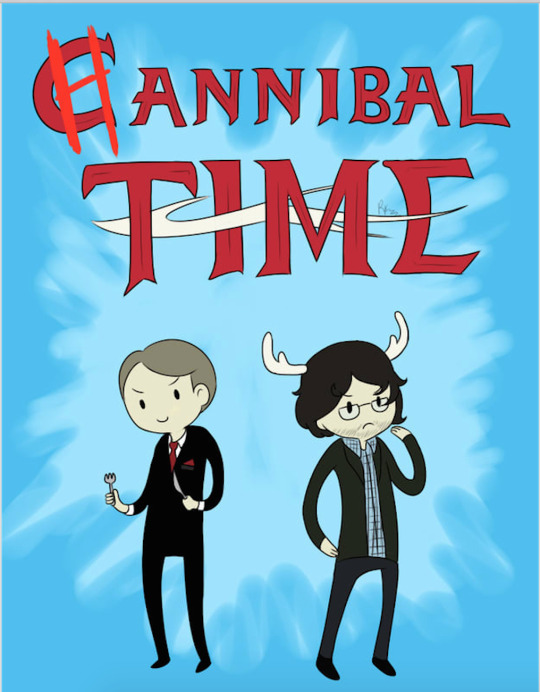
When the Hannibal fandom took over social media, people make memes about this appearance. Using facial expressions of celebrities to match the text which created a dramatic communication with other people. Likewise, when fans began to worry about whether the show has the possibility to be cancelled, since this genre of television show seems rarely to be renewed for second season. A large quantities of memes were emerged on the internet, showing their anxieties about the decision of NBC and express their feelings to the TV network that they would like to see more stories about the character.

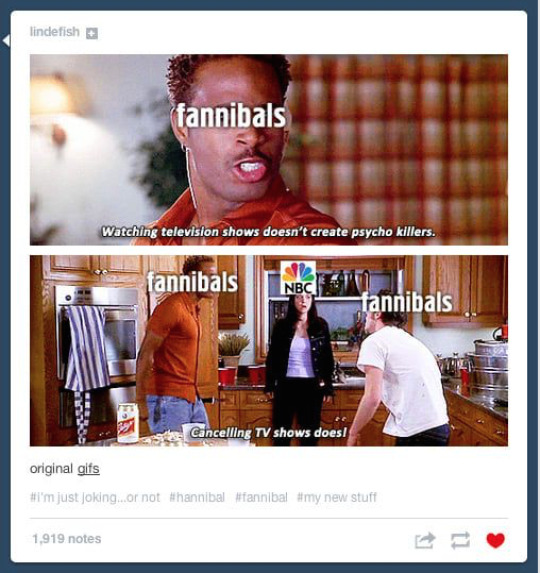
Next, fan videos were made on YouTube as soon as the show started. For example, the series of crack videos (2013) edited scenes from Hannibal with other famous shows quotes, conversations or songs which are quite hilarious. Not only the crack videos bring happiness to the fandom, but also some quality parodies stand out of these fan videos.
youtube
For instance, a parody called ‘If Hannibal were a bad chef’ (2015) made by professional production team CollegeHumor. It teases about the food presentation scenes and characters reactions about it by replace the elegant meal into obvious human organs or body parts. Accordingly, this video got more than 1000,000 viewers and 26,000 likes. The amount of positive reviews informs us whether it is a good or bad production.
youtube
Branston (2010) mentions that paratexts give audiences expectations about what they are going to be seeing and then frame their experiences in consuming that film or show. Since sometimes audience find out that in some scenes when Hannibal almost loudly implied cannibalism to Jack Crawford the head of Behavioral Science Unit at the FBI but he still couldn’t ‘figure it out’. Moreover, Reynolds, a folk singer made a fan song Become the Beast (2015) which inspired by NBC’s Hannibal in order to “explores the close, complex ‘bromance’ Hannibal has with Will Graham and Will’s descent into Hannibal’s dark world” says by Reynolds. The lyrics is actually a true portrayal of the relationship between Will and Hannibal. For instance, some sentences “Does it terrify you or do you feel alive?" “We are the lions, in a world of lambs” is perfectly the spirit of NBC's Hannibal.
youtube
However, at the beginning of 20th century, when the book about Hannibal first showed up, the only way that author connects to his reader was paper material, people tend to write letters for author as communication. As the time passes, movies that based on the novel provides much more paratext among audience, text and industry. For example, trailers were announced to audience in order to give them a glance of how the movie is about. It gives the audience basically what the story is about, where could they watch and who to watch them with.
Reflection
Although I get touch with foreign movies in a young age, China’s domestic features and politics didn’t quite allow audience to think individually and participate with the showrunners. It treated us as ‘mass audience’ and I hardly have any chance to engage with media texts, let alone make contributions to the show itself. In my country, fans were portrayed as a group of young teenagers who obsesses with fine-looking appearance actors and concentrate on digging out any information about the actors. My engagement with the Hannibal TV show, along with other concepts such as participatory culture and paratext, while growing up gave me impressions of what western media system works with audience and further established the problem between producers and fandom. Yet, this extent of communication seems difficult for my country to accomplish within a short period of time. Personally, even while engaging with texts such as Hannibal, I was able to point out things I knew will seems not be able to do especially when I get older. I did not been participate in the media text that I was passionate about and not figure out early enough the way producers respond to fans could potentially motivated them to engage with show more creative and active, or even affect the atmosphere around the show. Through my study of media and research for this essay, I have come to understand the importance of practice of paratext and textual poaching and have made a conscious effort to reshape my perception towards to media text, especially begin to reassess the relationship between individual fans and showrunners, because I understand that the success of a show is when quality social media fans and producers converge.
Conclusion
Even though the rapid development of fandom or the rejection that producers won’t let fans control where the show is head to, the power stills not simply lie on either side audience or author. Hannibal is one of the texts that transformed the concept of cannibalism into food appreciation and psychological thriller which more appealing to more audience thus engaging its fans. These textual poaching cannot be easily recognized as benefit or useless, since some of them have quality content and entertainment at the same time. As a matter of fact, whether it is a contribution or a teaser for the show, it appears to be what showrunners would like to see, people engaging with the show, advertising it on different platforms and eventually would raise the viewers and popularity. Therefore, they could even gain mutual benefit from the project. However, with its addressing of genre and social issues such as the sensitive concept of cannibalism, sexuality and the influence on children, it not only spread information to its audience but also influence people’s outlook who watched the show. Overall, it seems hard for showrunners to find a balance between pleasure the fans and will not make the show deviate from the original script. It largely requires a talent and open-minded creator who understands what’s fans desire but also have ideas about their own show, and the quality fandom which positively engaging with it. Hence, the power of decision didn’t centralize in producers’ hands or fandoms, on the contrary, they cooperate and complete each other. Although Hannibal make a good example about how fandom could actually live peacefully with showrunners, the conflict between two of them is still intense in recent years, it may need time for them to adjust and try to find a way to get along with each other.
Reference:
Andersen, M., 2016. Hannibal's Tasty Paradox. [online] 16:9 filmtidsskrift. Available from: http://www.16-9.dk/2016/01/hannibals-tasty-paradox/ [Accessed 19 Apr. 2017].
Anon, 2013. Hannibal Crackvid #1. [video] Available from: https://www.youtube.com/watch?v=7Lwr4X4_DCY [Accessed 10 Mar. 2017].
Anon, 2015. If Hannibal Were A Bad Chef. [video] Available from: https://www.youtube.com/watch?v=OkGjLch1L2g [Accessed 20 Mar. 2017].
Borders, M., 2016. FEEDING HANNIBAL: A CONNOISSEUR’S COOKBOOK Review. [online] Birth.Movies.Death. Available from: http://birthmoviesdeath.com/2016/10/18/feeding-hannibal-a-connoisseurs-cookbook-review [Accessed 14 May 2017].
Bourdaa, M., 2016. Contemporary participative TV audiences: Identity, authorship and advertising practices between fandom. Master. University of Bordeaux Montaigne, France.
Branston, G. and Stafford, R., 2010. The media student's book. 5th ed. London: Routledge, pp.382-388.
Genette, G., 2001. Paratexts. 1st ed. Cambridge [u.a.]: Cambridge Univ. Press, p.1.
Grant, D., 2014. TV Writers and Showrunners Increasingly ‘Mute’ the Fans. [online] Observer. Available from: http://observer.com/2014/11/tv-writers-and-showrunners-increasingly-mute-the-fans/ [Accessed 5 Apr. 2017].
Jenkins, H., 1992. Textual poachers: Television Fandom and Participatory Culture.London: Routledge.
Kresnicka, S., 2016. Why Understanding Fans is the New Superpower (Guest Column). [online] Variety. Available from: http://variety.com/2016/tv/columns/understanding-fans-superpower-troika-1201743513/ [Accessed 31 Mar. 2017].
Lang, N. and Covucci, D., 2013. "Hannibal" showrunners cater to fandom at Comic-Con | The Daily Dot. [online] The Daily Dot. Available from: https://www.dailydot.com/parsec/fandom/hannibal-comic-con-flower-crown-slash/ [Accessed 30 Apr. 2017].
Macklem, L., 2013. We’re on This Road Together: The Changing Fan/ Producer Relationship in Television as Demonstrated by Supernatural. Master. The University of Western Ontario.
McCracken, A., 2015. Branding Hannibal: When Quality TV Viewers and Social Media Fans Converge. [Blog] Antenna Responses to Media and Culture. Available from: http://blog.commarts.wisc.edu/2015/08/24/branding-hannibal-when-quality-tv-viewers-and-social-media-fans-converge/ [Accessed 22 Apr. 2017].
Reynolds, K., 2015. Become the Beast - A Hannibal Fan Song. [online] Available from: https://www.youtube.com/watch?v=xmVzeriU5m0 [Accessed 2 Apr. 2017].
Sandvoss, C., 2005. One-Dimensional Fan: Toward an Aesthetic of Fan Texts. American Behavioral Scientist, 48 (7), 822-839.
Segal, J., 2014. Hannibal Fandom. [online] Fannibals: TV Fandom & Paratexts. Available from: https://jessicasegalfnms.wordpress.com/hannibal-fandom/ [Accessed 25 Apr. 2017].
Wall, P. and Rayner, P., 2008. AS Media Studies. 3rd ed. London:Routledge, pp.145-148.
Williams, J., 2015. RESEARCHING DIGITAL FANDOM. [Blog] FANDOM, SUB-CULTURES AND CULT MEDIA STUDIES. Available from: https://jackpressfandom.wordpress.com/ [Accessed 5 Apr. 2017].
Williams, R., 2015. Cooking with Hannibal: Food, Fandom & Participation | In Media Res. [online] Mediacommons.futureofthebook.org. Available from: http://mediacommons.futureofthebook.org/imr/2015/09/23/cooking-hannibal-food-fandom-participation [Accessed 7 Apr. 2017].
2 notes
·
View notes